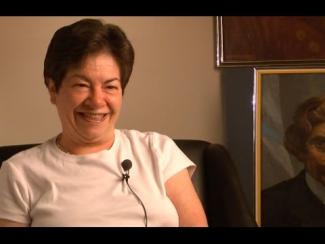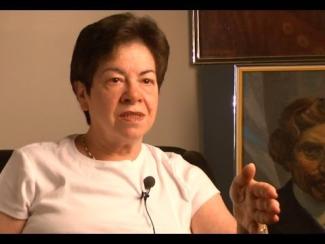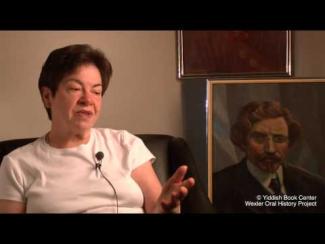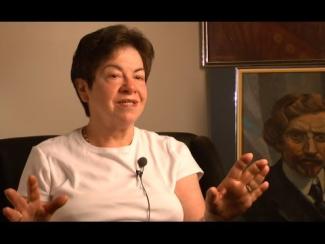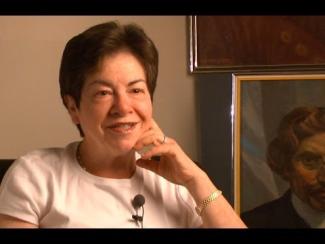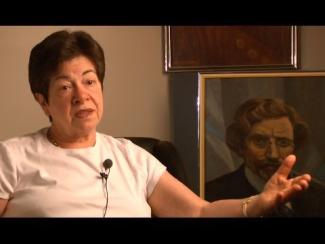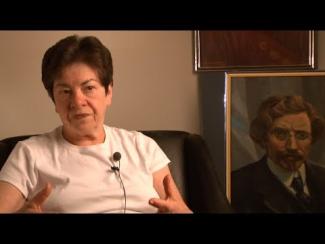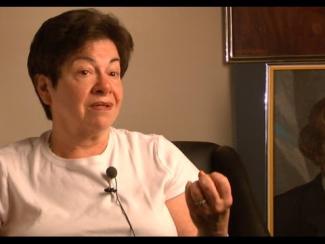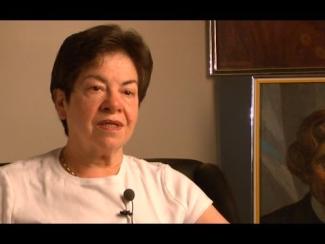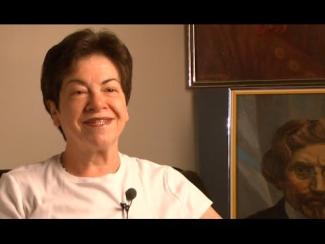The Yiddish Book Center's
Wexler Oral History Project
A growing collection of in-depth interviews with people of all ages and backgrounds, whose stories about the legacy and changing nature of Yiddish language and culture offer a rich and complex chronicle of Jewish identity.
Eva Raby's Oral History
Eva Raby, former director of the Montreal Jewish Public Library, was interviewed by Christa Whitney on July 10, 2012 at the Montreal Jewish Public Library in Montreal, Canada. Eva's maternal grandfather owned a publishing company in Vilna, and her mother grew up surrounded by writers and members of the Vilna Troupe theater company. Once settled in Canada, Eva's parents opened their home to Yiddish writers who lived in or visited Montreal, including, Avrom Reyzen, Melech Ravitch, Avrom Sutzkever, Shmerke Kaczerginski, and Rokhl Korn. Eva grew up in a Yiddish, Russian, and English-speaking household. Both parents had rejected organized religion. Her mother was surprised that several of her children began keeping kosher as adults and various grandchildren returned to traditional religious practice. Eva's father worked in the rubber industry, first in Poland and then in Romania. Trying to escape the Russians, her parents had papers for Paraguay but ended up spending a few years in Portugal, and then joining relatives in Montreal with a textile business. They ended up being among only 5,000 Jews accepted into Canada during the World War II years. Eva's parents were Labor Zionists who sent her to a Yiddish folkshul. She attended at least part time through high school and became interested in Jewish history, inspiring her career path. Eva explains why a relatively small city like Montreal ended up with an extensive shule system and institutions like the Jewish Public Library, both serving mostly secular Yiddish speakers of limited means who were unable to attend university due to social or financial barriers. She suggests that Montreal never became a "melting pot" due to the fundamental French Catholic/English Protestant divide in the school system and elsewhere, so strong ethnic identities were maintained longer than in other cities. Eva's home was full of books from ceiling to floor; she wonders whether this is why her siblings, Ruth Wisse and David Roskies became scholars and writers and she became a librarian. After getting her post-graduate degree in history, she worked in various libraries at McGill University for many years. Taking a short break for child-rearing, she then accepted a position as head of the new Children's Library at the Jewish Public Library, although she had little experience with storytelling or children's programming. In this role, Eva organized programming for young children. A highlight was getting a grant for Yiddish programming from "Multiculturalism Canada." She expresses how much she enjoyed the seventeen years she spent in that role before taking over as Library Director. Eva describes the diverse communities that use the library, which collects books in various languages according to need. One important project was "Talking Books" where elderly Yiddish speakers recorded Yiddish books. They also had an archive of disintegrating taped lectures by visiting writers and notables, but digitizing all of them was prohibitively expensive until the Jewish Public Library, along with three other independent libraries in Montreal, collaborated on a large grant. She describes how the Library developed a collaboration with the Yiddish Book Center to digitize the Yiddish Talking Book tapes and the lecture tapes. Eva discusses how the goals of the library needed to be re-imagined as the original Yiddish-speaking population aged and passed on. She describes new programs she started including musical Yiddish Cafes, Yiddish film screenings, and visiting scholar presentations. Eva ends by talking about the beauty and richness of the Yiddish language and her concerns about its future.
This interview was conducted in English.
Eva Raby was born in Montreal, Québec, Canada in 1942.

